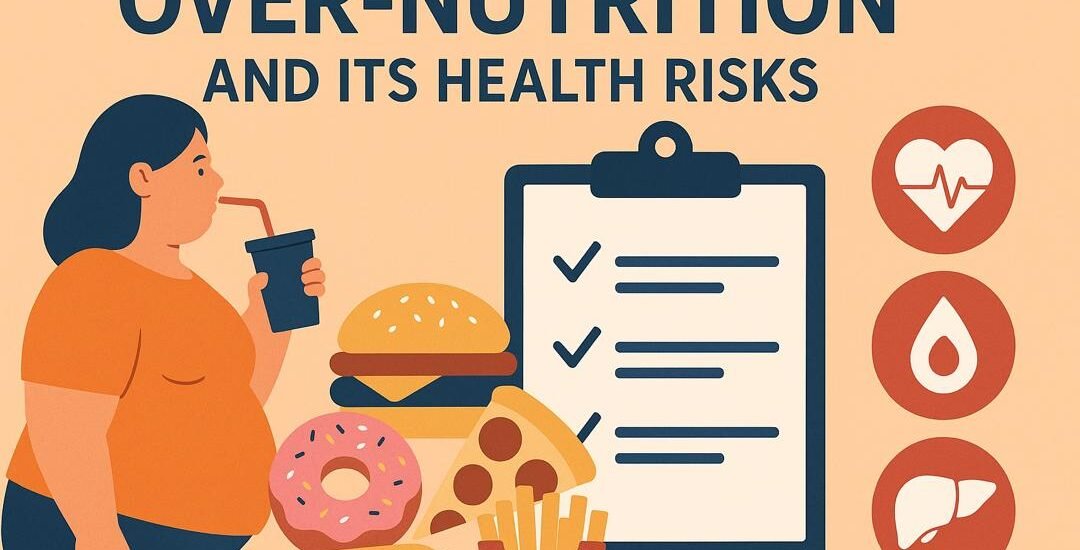In a world where hunger still affects millions, another silent epidemic is growing rapidly—overnutrition. Often overshadowed by undernutrition, overnutrition is a serious public health concern, especially in urbanizing societies. It results from an excessive intake of nutrients, especially calories, sugar, and unhealthy fats, and is typically associated with unhealthy eating habits, low physical activity, and sedentary lifestyles.
What Is Overnutrition?
Overnutrition occurs when the intake of nutrients exceeds the body’s needs, leading to an energy imbalance. Unlike undernutrition, which results in deficiencies, overnutrition causes a buildup of excess fat and can lead to multiple non-communicable diseases (NCDs). It is often linked to diets high in processed foods, sugary drinks, fast food, and low levels of fruits, vegetables, and whole grains.
Health Risks of Overnutrition
- Obesity
- One of the most visible consequences of overnutrition is obesity. Excess caloric intake, especially from unhealthy fats and sugars, leads to fat accumulation in the body. Obesity is not just a cosmetic issue—it’s a complex disease that increases the risk of various chronic conditions.
- Type 2 Diabetes
- Overeating and weight gain, particularly abdominal fat, reduce insulin sensitivity. Over time, this can cause insulin resistance and result in type 2 diabetes. High sugar consumption is especially dangerous.
- Cardiovascular Diseases
- Diets rich in saturated fats, trans fats, and salt raise blood cholesterol and blood pressure, leading to atherosclerosis (narrowing of the arteries), heart attacks, and strokes.
- Certain Types of Cancer
- Research links overnutrition, particularly obesity, to higher risks of developing cancers such as breast, colon, kidney, and pancreatic cancer. Excess body fat can cause hormonal imbalances and chronic inflammation that contribute to cancer development.
- Liver Disease
- Non-alcoholic fatty liver disease (NAFLD) is now common due to overconsumption of sugary and fatty foods. This condition can progress to liver inflammation, cirrhosis, or even liver failure.
- Metabolic Syndrome
- Overnutrition often contributes to metabolic syndrome, a cluster of conditions including high blood pressure, high blood sugar, abnormal cholesterol levels, and abdominal obesity. Together, these increase the risk of heart disease, stroke, and diabetes.
- Joint and Mobility Problems
- Carrying excess weight puts stress on joints, particularly the knees and hips, increasing the risk of osteoarthritis and reducing physical mobility.
- Mental Health Issues
- Overnutrition and obesity can contribute to depression, anxiety, and low self-esteem. Furthermore, poor diets high in sugars and processed foods are linked to mood disorders.
Who Is at Risk?
While overnutrition can affect anyone, it’s more common in urban populations with access to energy-dense foods and low levels of physical activity. Children, adolescents, and adults alike are at risk, particularly those in environments where healthy food choices are limited and fast food is readily available.
Prevention and Control
Preventing overnutrition requires a balanced approach to eating and lifestyle habits:
- Adopt a healthy, balanced diet rich in whole grains, fruits, vegetables, lean proteins, and healthy fats.
- Reduce consumption of processed and fast foods, sugary drinks, and snacks high in salt and sugar.
- Engage in regular physical activity (at least 30 minutes a day).
- Practice mindful eating—pay attention to hunger cues and avoid emotional or binge eating.
- Promote nutrition education at the community and school levels to encourage healthy behaviors from a young age.
Conclusion
Overnutrition is not simply about eating too much—it’s about eating too much of the wrong things. As lifestyles shift and food environments change, awareness of the health risks of overnutrition is essential. By prioritizing nutrition education, healthy food environments, and active living, we can reverse this growing trend and protect our communities from the long-term health consequences.
📌 Your health is not just about eating enough—it’s about eating right. Stay informed. Stay balanced.




